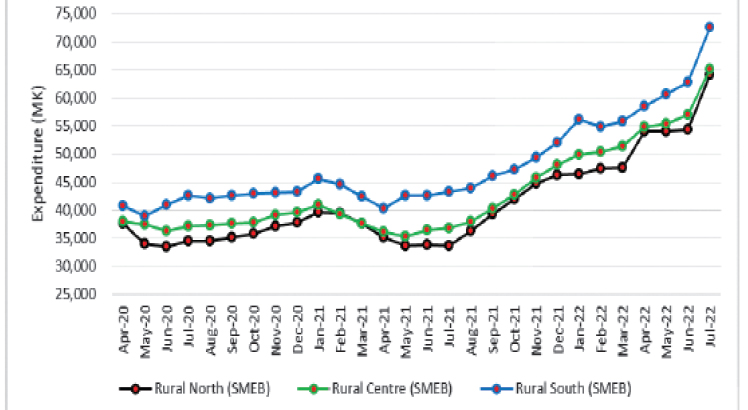‘Rising prices push up cost of living’
Rising food and non-food prices have pushed up the survival minimum expenditure basket (Smeb), with the largest change in household expenditure observed in urban areas, a new World Food Programme (WFP) report shows.
Smeb is the minimum amount a household needs to maintain existence and cover life-saving needs.
In its report titled ‘Minimum Expenditure Basket in Malawi’ published recently, the WFP says both food and non-food expenditure rose by 3.5 percent and 3.7 percent, respectively, resulting in a 3.6 percent rise in a typical household’s minimum expenditure from K88 372 in June to K 91 535 as at mid-July.

Reads the report in part: “This means that a typical 4.5-member household residing in any of the cities required an additional K3 163 per month during the current round to meet its basic survival food and non-food requirements.”
The WFP figures show that Smeb increased in the rural Northern Region, rural Central Region and rural Southern Region by 10.1percent, 6.6 percent and 7.6 percent, respectively.
According to the figures in the rural Northern Region, expenditure surged to K 67 313 per month in July, from K61 111 per month in June while in the rural Central Region, expenditure rose to K67 161 per month in July from K62 976 per month in June.
In the Southern Region, expenditure rose from K59 742 per month in June to K69 914 in July.
Centre For Social Concern (CfSC) economic governance programme officer Bernard Mphepo said in an interview on Tuesday that most Malawians are hardly surviving as the cost of living largely pushed by food prices has continued to rise.
He said: “The cost of living is expected to continue rising, in the process making it hard for Malawians to access basic items.”
On his part, Consumers Association of Malawi executive director John Kapito said the current situation is hard for consumers, “whose incomes have also dwindled due to the recent devaluation of the kwacha”.
He said: “Economically and socially, we don’t know where this leads to, but one can predict that the current economic situation has negatively impacted all sectors of life.”
Presently, inflation—the rate of increase in prices over a given period of time—has been on the rise for the past months largely due to increase in food and non-food items.
For instance, in a space of six months, the inflation rate has nearly doubled from 12.1 percent in January to 23.5 percent as of June, according to the National Statistical Office figures.
The rising cost of items will, therefore, have a negative impact, especially on lower-income households’ access to food and necessities as it would continue to push up inflation.





